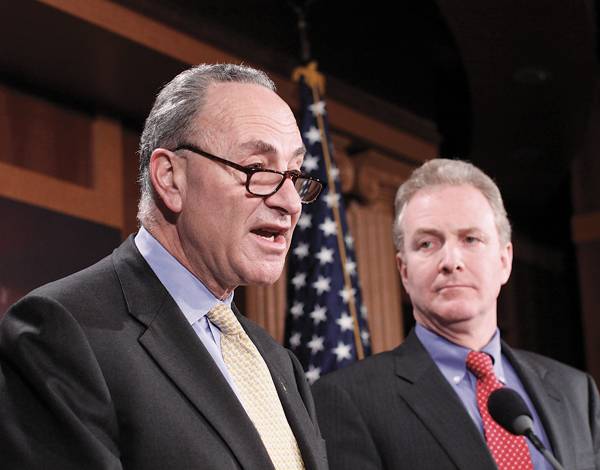HASENMILLER: Corporate politics

Sen. Charles Schumer, left, accompanied by Rep. Chris Van Hollen, talks to reporters Jan. 21 on Capitol Hill in Washington. The Supreme Court’s decision on campaign finance has jumbled a seemingly simple rule of American politics. The ruling overturned a law that limited the size of campaign contributions by corporations and unions. Photo: Victoria Burke/The Associated Press
February 7, 2010
Recently, the Supreme Court voted five-to-four to overturn a law limiting the size of campaign contributions made by corporations and unions. This ruling was described by Justice John Paul Stevens as “[threatening] to undermine the integrity of elected institutions around the nation.” Though the First Amendment was used as justification, a simple read through of Article I, Section 8 of our Constitution would have been more than adequate for this decision.
The main problem that many people — for example, Stevens — have with this ruling is that if corporations are allowed to donate unlimited amounts of money, they will use that money to purchase favors from the politicians to whom they donate.
In his book “Freedomnomics,” economist John Lott argues this is not the case. He says that, if corporations were buying votes, you should be able to see a change in a politician’s voting habits after they decide to retire due to a lack of need for more campaign contributions. However, a study by Lott and economist Steve Bronars of 731 congressmen showed that on average, the congressman’s voting pattern changed on only one out of every 450 votes.
Lott also explains that politicians, until 1994, were allowed to spend unused contributions on whatever they wanted as long as they were first elected before 1980. This would lead one to believe that retiring politicians would have often been given donations, which could be used by the politicians personally, as a reward for casting votes in favor of various businesses. This almost never happened either.
What campaign finance laws really do, says Lott, is help out the incumbents. Because incumbents already have an established reputation, a dollar spent on campaigning for an incumbent is less valuable then a dollar spent campaigning for a challenger. This is because the challenger has so much more to inform the public about — things they already know about the incumbent.
In economic terms, that means the marginal value of the challenger’s money is greater than the marginal value of the incumbent’s. It’s no wonder politicians like campaign finance laws so much. They may help the very politicians who vote for them keep their jobs.
Since the passing of the Federal Election Campaign Act in 1974, incumbent victories have risen from 88 to 94 percent in the House, and from 76 to 81 percent in the Senate. In state Senate races, campaign finance regulations approximately double the chance that only one candidate will run. And spending limits tend to lower voter turnouts. Now, correlation of course does not necessarily imply causation, but it would seem that the elimination of campaign finance laws would actually level out the playing field a little in elections.
And besides, if the federal government is allowed to mandate what a corporation can and cannot do with its money, whose money is it, really? The corporation’s or the government’s?
If you really desire to decrease the chance that a company will “buy” a politician, reduce their incentive to do so. Politicians currently control well over $3 trillion of taxpayer money. It’s no wonder everyone’s trying to get their hands on it.
By reducing government spending and providing checks and regulations on what the government can use its money for, we can make vote-buying a less profitable venture in the first place. Campaign finance laws aren’t the way to do it.






